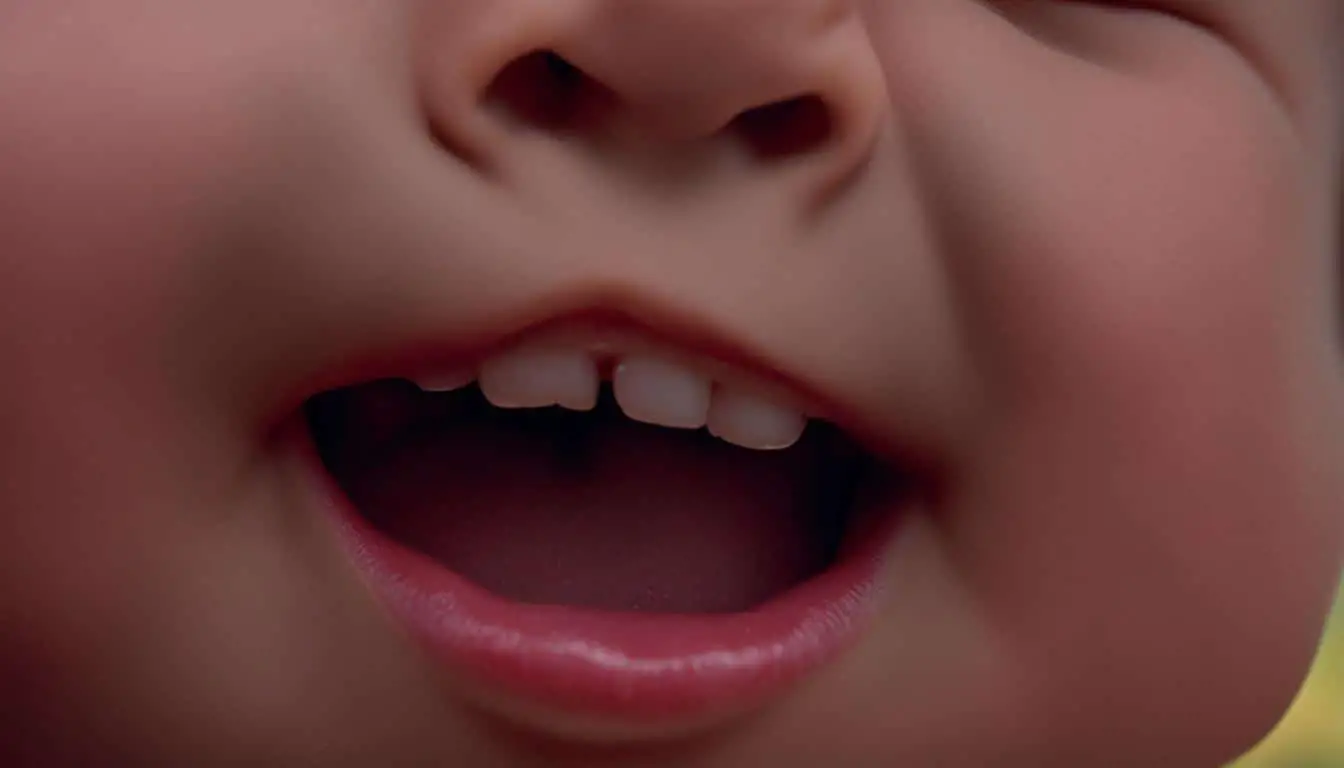
Understanding and Managing Baby’s Teething Pain
Teething is a common experience for babies that can cause discomfort and pain. It usually begins around 6 months of age, with the bottom front teeth appearing first, followed by the top front teeth. Common signs of teething include excessive drooling, chewing on objects, irritability, sore gums, and a slight increase in temperature. However, fever and diarrhea are not symptoms of teething and should be discussed with a doctor.
To soothe sore gums, parents can rub their baby’s gums with a clean finger or wet gauze, provide a cold spoon or chilled teething ring, or consider using over-the-counter pain medications like acetaminophen or ibuprofen, if necessary. It is important to avoid using teething tablets, teething necklaces, or medications containing benzocaine or lidocaine, as these can be harmful to babies. Regular dental care, including cleaning the baby’s gums and teeth, is also important for their oral health.
Key Takeaways:
- Baby teething can cause discomfort and pain.
- Common signs of teething include excessive drooling, chewing on objects, irritability, sore gums, and a slight increase in temperature.
- Consult a doctor if your baby experiences fever or diarrhea.
- To soothe sore gums, gently rub the baby’s gums with a clean finger or wet gauze.
- Provide a cold spoon or chilled teething ring for additional relief.
Safe and Effective Teething Remedies

When it comes to managing baby teething pain, there are several safe and effective remedies that parents can utilize. It’s essential to prioritize the baby’s comfort and well-being during this challenging time. Teething rings made of firm rubber are a popular choice as they provide babies with something safe to chew on, relieving discomfort and distracting them from pain. It’s important to follow the instructions provided with the teething ring, including how long to chill it in the fridge for additional relief.
Rubbing the baby’s gums with a clean finger can also help alleviate teething pain. This gentle massage offers temporary relief by applying pressure to the sore gums. It’s essential to wash hands thoroughly before touching the baby’s gums to maintain proper hygiene.
While some parents may consider using teething gels, it’s important to note that there is limited evidence of their effectiveness. If parents decide to use a gel, they should ensure it is specifically designed for young children and consult a pharmacist for advice. It’s important to highlight that general oral pain relief gels are not suitable for teething babies.
Table: Comparison of Teething Remedies
| Remedy | Description | Efficacy | Recommended Age |
|---|---|---|---|
| Teething Rings | Chewable rings made of firm rubber | Provides relief and distraction | From 3 months |
| Rubbing Gums | Gently massaging the baby’s gums with a clean finger | Temporary relief by applying pressure | From 3 months |
| Teething Gels | Gels specifically designed for teething babies | Limited evidence of effectiveness | From 4 months (consult pharmacist) |
Comforting a Teething Baby
Aside from the mentioned remedies, there are other ways to provide comfort to a teething baby. Parents can engage their baby in playful activities and provide age-appropriate toys to distract them from the discomfort. Gentle gum rubbing with a clean finger can also provide temporary relief.
“The teething process can be challenging for both babies and parents. Ensuring that we use safe and effective remedies is crucial for the baby’s well-being.” – Pediatric Dentist
It’s important to monitor the baby for any signs of teething rashes caused by excessive drooling. Parents can prevent rashes by gently wiping the baby’s face with a soft cloth or baby wipe throughout the day. Maintaining good oral hygiene for the baby is also vital. Regularly clean the baby’s gums with a clean damp cloth or gauze and introduce brushing with a small, soft-bristled toothbrush as soon as the first milk tooth appears.
Conclusion
Managing baby teething pain can be challenging, but with the right strategies, I can help alleviate my baby’s discomfort. It is important to understand the signs of teething and differentiate them from other symptoms like fever and diarrhea. Safe and effective remedies include using teething rings, rubbing my baby’s gums, and providing appropriate pain relief medications if necessary.
It is crucial to avoid potentially harmful remedies like teething necklaces and medications containing benzocaine or lidocaine. Regular dental care, including cleaning my baby’s gums and teeth, is essential for their oral health. I should register my baby with a dentist when the first teeth appear and start brushing their teeth with fluoride toothpaste as soon as the first milk tooth breaks through.
Regular dental checkups are recommended to ensure a lifetime of healthy teeth and gums. By implementing these strategies, I can effectively manage my baby’s teething pain and promote good oral health.
FAQ
What are the common signs of teething in babies?
Common signs of teething include excessive drooling, chewing on objects, irritability, sore gums, and a slight increase in temperature.
Are fever and diarrhea symptoms of teething?
No, fever and diarrhea are not symptoms of teething. If your baby has a fever or diarrhea, it is important to consult a doctor.
How can I soothe my baby’s sore gums?
You can rub your baby’s gums with a clean finger or wet gauze, provide a cold spoon or chilled teething ring, or consider using over-the-counter pain medications like acetaminophen or ibuprofen if necessary.
What should I avoid when it comes to teething remedies?
Avoid using teething tablets, teething necklaces, or medications containing benzocaine or lidocaine, as these can be harmful to babies.
How should I care for my baby’s new teeth?
It is important to start practicing regular dental care, including cleaning the baby’s gums and teeth. Register your baby with a dentist when the first teeth appear and start brushing their teeth with fluoride toothpaste as soon as the first milk tooth breaks through. Regular dental checkups are recommended to ensure a lifetime of healthy teeth and gums.
Source Links
- https://www.fda.gov/consumers/consumer-updates/safely-soothing-teething-pain-and-sensory-needs-babies-and-older-children
- https://www.nhs.uk/conditions/baby/babys-development/teething/tips-for-helping-your-teething-baby/
- https://www.mayoclinic.org/healthy-lifestyle/infant-and-toddler-health/in-depth/teething/art-20046378